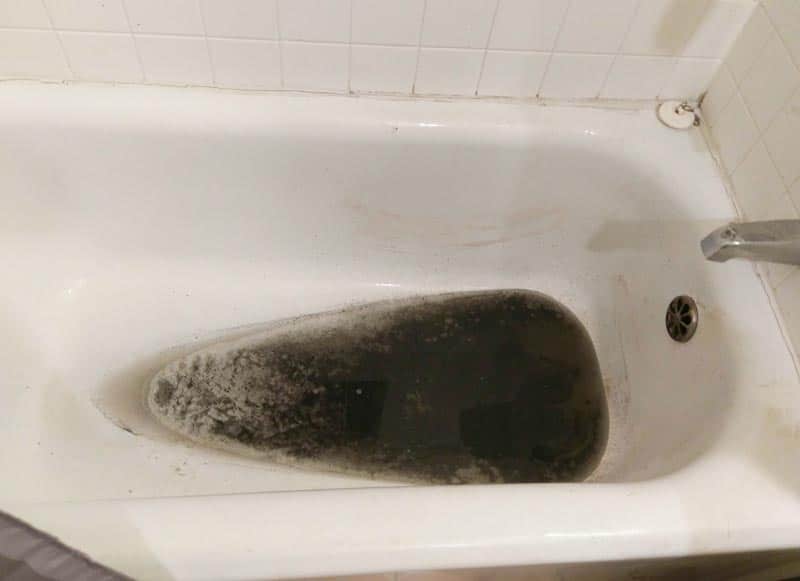Unveiling the Causes of Discharge in the Bathtub
Unveiling the Causes of Discharge in the Bathtub
Blog Article
What are your ideas regarding Why is There Sewage Coming Up Through the Bathtub?

Sewage back-up in the tub can be a distressing and unhygienic issue for any kind of homeowner. Not only is it bothersome, however it likewise presents severe health threats and suggests underlying concerns with the plumbing system. Comprehending why sewer is coming up with the bathtub is crucial for taking appropriate activity to attend to the trouble efficiently.
Introduction to the Problem
Usual Factors for Sewer Back-up
Clogs in the Sewage System Line
Among the most common causes of sewage back-up is an obstruction in the drain line. This can occur as a result of the buildup of debris, grease, or foreign things in the pipes, stopping proper circulation and triggering sewage to back up right into your tub.
Tree Origin Invasion
Tree origins seeking wetness and nutrients can infiltrate drain lines via little splits or joints. Gradually, these origins can grow and broaden, causing substantial damages to the pipes and causing sewer back-up concerns.
Comprehending the Issue
When sewage starts backing up right into the bath tub, it's a clear sign of an issue with the drain system. The wastewater that ought to be flowing far from your home is instead locating its way back right into your home, which can cause significant damages and carcinogen.
Prospective Causes
Several variables can contribute to sewage backup in the tub. From obstructions in the sewer line to issues with the plumbing infrastructure, recognizing the source is essential for finding a solution.
Aging Facilities
Older homes might have outdated plumbing systems that are extra vulnerable to corrosion, cracks, and degeneration. As pipes age, they come to be a lot more prone to leakages and clogs, increasing the possibility of sewer backup events.
Heavy Rainfall or Flooding
Throughout periods of heavy rainfall or flooding, the sewer system may become overloaded with excess water, causing back-ups and overflows. This can result in sewage supporting right into tubs and other components inside the home.
Indicators of Sewer Back-up
Foul Odors
Undesirable odors rising from drains pipes or fixtures, especially in the restroom, might show sewage backup concerns. These smells are often solid and relentless, signaling a problem that requires instant focus.
Slow Draining Fixtures
Bath tubs, sinks, and toilets that drain slowly or not in any way could be experiencing sewer back-up. If numerous fixtures are affected all at once, it's most likely that the issue stems from an usual point, such as the major sewage system line.
Gurgling Sounds
Odd gurgling or bubbling sounds coming from drains pipes when water is running in other places in your house are a measure of air trapped in the plumbing system. This air buildup can arise from sewer back-up and must be explored immediately.
Health Risks Connected With Sewage Backup
Contamination of Water Supply
Sewage back-up can pollute the water in your home, presenting a major health and wellness risk to you and your household. Exposure to polluted water can result in intestinal problems, skin infections, and various other ailments.
Mold Development
Moisture from sewer back-up can develop excellent problems for mold development in your home. Mold and mildew spores can aggravate respiratory system issues and cause allergies in sensitive people, making punctual cleanup essential.
Spread of Condition
Sewage has harmful germs, infections, and parasites that can cause a variety of conditions, including liver disease, cholera, and gastroenteritis. Entering into contact with sewer or contaminated surfaces places you at risk of infection.
Cleaning Up After Sewer Back-up
Sanitation Procedures
Completely decontaminate and disinfect affected locations after sewage backup to get rid of hazardous bacteria and avoid mold and mildew growth. Use appropriate cleansing products and safety gear to make certain risk-free and effective cleanup.
Restoration of Influenced Locations
Fix any damage to floor covering, wall surfaces, or fixtures brought on by sewage back-up. Depending upon the extent of the damage, you might need to replace carpeting, drywall, or other products to recover your home to its pre-loss problem.
Immediate Actions to Take
Switching Off Water
In case of sewage back-up, it's essential to turn off the supply of water to stop more contamination and damages. Locate the major water shutoff valve in your house and closed it off till the problem can be fixed.
Calling a Specialist Plumber
Dealing with sewage backup is not a do it yourself job. Get in touch with a certified plumber with experience in dealing with sewage-related problems to assess the circumstance and execute required repairs or cleanups.
Preventing Contact with Contaminated Water
Until the sewer backup is fixed, stay clear of contact with contaminated water to prevent the spread of microorganisms and virus. Wear safety gear if you need to be in the damaged location and wash your hands thoroughly afterward.
Safety nets
Normal Upkeep of Sewer Lines
Arrange routine inspections and maintenance of your sewage system lines to identify and address possible concerns prior to they escalate right into significant problems. This can consist of cleaning out particles, checking for tree root invasion, and fixing any kind of damaged pipes.
Mounting Bayou Shutoffs
Consider mounting bayou valves in your plumbing system to stop sewage from receding into your home throughout periods of heavy rainfall or flooding. These shutoffs immediately close when water draws back up, securing your home from contamination.
Correct Disposal of Home Waste
Prevent purging anything besides bathroom tissue and human waste down the commode to stop blockages and blockages in the sewage system line. Dispose of grease, oil, and other family chemicals properly to decrease the risk of plumbing problems.
Why Is Water Backing Up in My Bathtub When I Flush My Toilet?
What to do about a sewer line clog
First, don’t bother with plunging. No amount of plunging will dislodge the clog in a sewer line. The clog is too far away. Plungers are for clogs in the toilet itself, not the sewer line. Plus, the most likely causes of a sewer clog are:
Tree roots Flushed toys or feminine products Grease buildup Those items don’t move easily. And in the case of tree roots, the roots need to be cut out of the pipe and the pipe will need to be repaired.
You’ll need a closet auger. A closet auger is a type of plumber’s snake with a protective cover to keep from scratching the delicate porcelain toilet. If the clog is further down, you may need to remove the toilet or use one of your cleanouts to get to the clog.
We also recommend doing a video inspection of the drain to ensure that the cause of the clog has been completely removed. Otherwise, you could have the same problem again in a few days or weeks.
https://mspplumbingheatingair.com/blog/why-is-water-backing-up-in-my-bathtub-when-i-flush-my-toilet

As a fervent reader on Why is Sewage Backing Up Into My Bathtub?, I think sharing that topic was smart. Do you know somebody else who is intrigued by the niche? Be sure promote it. Thanks so much for going through it.
Book Your Appointment
Report this page